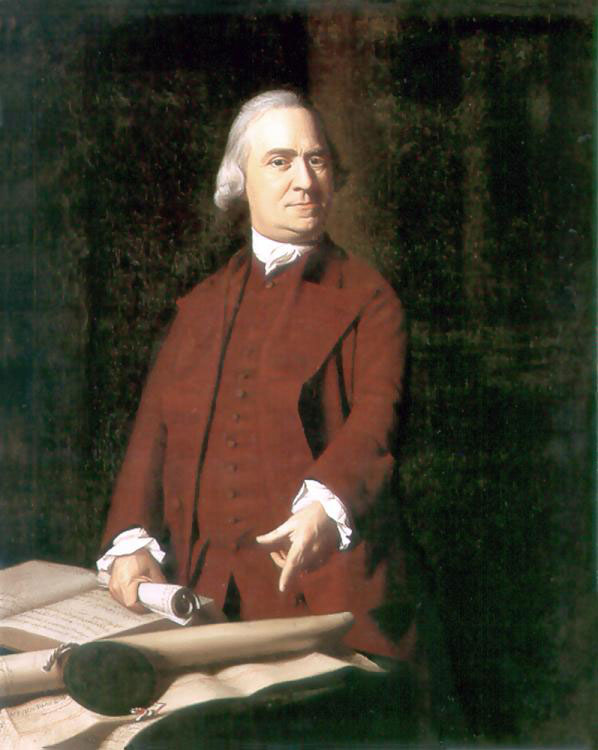“How strangely will the Tools of a Tyrant pervert the plain Meaning of Words!”
Letter to John Pitts (21 January 1776) http://www.gutenberg.org/dirs/etext00/3sdms10.txt
Samuel Adams bol americký politik, spisovateľ a politický filozof. Patril k popredným bojovníkom za nezávislosť amerických kolónií od britskej nadvlády. Wikipedia

“How strangely will the Tools of a Tyrant pervert the plain Meaning of Words!”
Letter to John Pitts (21 January 1776) http://www.gutenberg.org/dirs/etext00/3sdms10.txt
As quoted in Radical Puritan, by Fowler, 51–52
Speech in Philadelphia (1776)
Varianta: Driven from every other corner of the earth, freedom of thought and the right of private judgment in matters of conscience, direct their course to this happy country as their last asylum.
“What a glorious morning is this!”
Comment upon hearing the gunfire at the Battle of Lexington (19 April 1775), as quoted in An address, delivered at Lexington, on the 19th (20th) April, 1835 (1835) by Edward Everett; this has often been paraphrased as "What a glorious morning for America!"
Speech about Declaration of Independence (1776)
Speech in Philadelphia (1776)
Speech about Declaration of Independence (1776)
Letter to John Adams (4 October 1790) http://www.gutenberg.org/dirs/etext00/4sdms10.txt
Rejected resolution for a clause to add to the first article of the U.S. Constitution, in the debates of the Massachusetts Convention of 1788 (6 February 1788); this has often been attributed to Adams, but he is nowhere identified as the person making the resolution in Debates and Proceedings in the Convention of the Commonwealth of Massachusetts, Held in the year 1788 And which finally ratified the Constitution of the United States. (1856) p. 86. https://archive.org/details/debatesandproce00peirgoog<!-- Printed by the Resolves of the Legislature, 1856. Boston: William White, Printer of the Commonwealth.
Variant: The said Constitution shall never be construed to authorize Congress to infringe the just liberty of the press or the rights of conscience; or to prevent the people of The United States who are peaceable citizens from keeping their own arms...
As quoted in Debates and Proceedings in the Convention of the Commonwealth of Massachusetts (1850) edited by Peirce & Hale
Disputed
Speech in Philadelphia (1776)
“I firmly believe that the benevolent Creator designed the republican Form of Government for Man.”
Statement of (14 April 1785), quoted in The Writings of Samuel Adams (1904) edited by Harry A. Cushing
Address to acting governor Thomas Hutchinson, 6 March 1770, the day following the Boston Massacre. Hutchinson had offered to remove one of the two British regiments stationed in Boston. http://books.google.com/books?vid=ISBN0395825105&id=EQriRekKKPMC&pg=PA68&lpg=PA68&dq=%22Night+is+approaching.+An+immediate+answer+is+expected.+Both+regiments+or+none%22&sig=P3liJRs37lVSpjUrLHv7bPdEuXk
addressing a meeting of delegates to the Continental Congress, assembled at Yorktown, Pennsylvania, September 1777 ; as quoted in The Life and Public Services of Samuel Adams, Volume 2, by William Vincent Wells; Little, Brown, and Company; Boston, 1865 ; pp. 492-493
Speech about Declaration of Independence (1776)
Arguing for a Riot Act which prohibited 12 or more persons from congregating in public and which empowered county sheriffs to kill rioters, during debates prompted by Shays' Rebellion (1786 - 1787) and the death sentences given to many of the rebels; as quoted in Howard Zinn, A People's History of the United States http://libcom.org/a-peoples-history-of-the-united-states-howard-zinn/5-a-kind-of-revolution (1980) Chapter 5 : A kind of Revolution; also quoted in "Completing the American Revolution" by Norman D. Livergood http://www.hermes-press.com/completing.htm
Speech in Philadelphia (1776)
The Rights of the Colonists (1772)
"Loyalty and Sedition," essay published in The Advertiser (1748) http://thingsabove.freerovin.com/samadams.htm, later printed in The Life and Public Service of Samuel Adams, Volume 1 (1865), by William Vincent Wells
Rejected resolution for a clause to add to the first article of the U.S. Constitution, in the debates of the Massachusetts Convention of 1788 (6 February 1788); this has often been attributed to Adams, but he is nowhere identified as the person making the resolution in Debates and Proceedings in the Convention of the Commonwealth of Massachusetts, Held in the year 1788 And which finally ratified the Constitution of the United States. (1856) p. 86. https://archive.org/details/debatesandproce00peirgoog
Disputed
Speech about Declaration of Independence (1776)
Bid us and our posterity bow the knee, supplicate the friendship and plough, and sow, and reap, to glut the avarice of the men who have let loose on us the dogs of war to riot in our blood and hunt us from the face of the earth? If ye love wealth better than liberty, the tranquility of servitude than the animated contest of freedom — go home from us in peace. We ask not your counsels or arms. Crouch down and lick the hands which feed you. May your chains sit lightly upon you, and may posterity forget that you were our countrymen!
Speech in Philadelphia (1776)
Varianta: If ye love wealth better than liberty, the tranquility of servitude <ins>better</ins> than the animat<del>ed</del><ins>ing</ins> contest of freedom — go <del>home</del> from us in peace. We ask not your counsels or <ins>your</ins> arms. Crouch down and lick the hands which feed you. May your chains <del>sit</del><ins>set</ins> lightly upon you, and may posterity forget that you were our countrymen<del>!</del><ins>.</ins>
We have appealed to Heaven for the justice of our cause, and in Heaven we have placed our trust. [...] We shall never be abandoned by Heaven while we act worthy of its aid and protection.
addressing a meeting of delegates to the Continental Congress, assembled at Yorktown, Pennsylvania, September 1777 ; as quoted in The Life and Public Services of Samuel Adams, Volume 2, by William Vincent Wells; Little, Brown, and Company; Boston, 1865 ; pp. 492-493